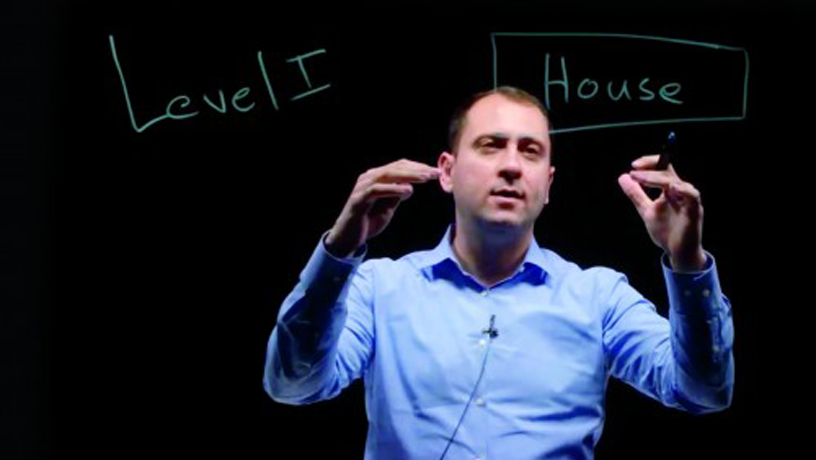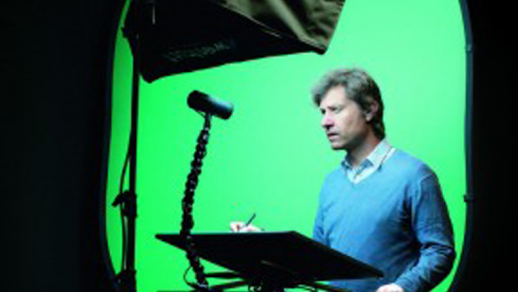Reaching New Audiences with Columbia Video Network
Columbia Engineering has always taken a leadership position designing innovative, video-based classes, but this year Columbia Video Network (CVN) is pushing the boundaries even further, helping professors harness CVN’s technology to flip their on-campus classes, and launching their first Massive Open Online Course (MOOC) specialization on Coursera.

Ibrahim Odeh teaches the School’s first civil engineering MOOC.
(Photo by Jeffrey Schifman)
“The sky is the limit when it comes to what you can use these modules for,” said Ibrahim Odeh, the professor designing and teaching the new MOOC and the founding director of the Global Leaders in Construction Management (GLCM) program in the Civil Engineering and Engineering Mechanics Department.
CVN has been a part of Columbia since its establishment in 1986; where once the department would mail videotapes of lectures to students, today it streams lectures, hosts exams, and facilitates discussion for 300 students in as many as 60 classes each semester. CVN offers certificate programs and master’s degrees in almost every engineering discipline, including applied mathematics, materials science, and biomedical, civil, electrical, and chemical engineering. It awards doctorates in mechanical engineering, electrical engineering, computer science, and earth and environmental engineering; and there are 10 to 20 doctoral students enrolled at any given time. CVN entered the nascent MOOC market in 2013 with the introduction of three free, noncredit courses in operations research, natural language processing, and MOS transistors.
Operating out of two recording studios—including one lightboard studio that lets instructors use a glass “whiteboard” designed for video lectures—the department has been investing in new staff, equipment, and infrastructure to stay on top, according to Nancy Rubin, executive director of CVN.
“What we bring is the quality of the instructors and the production value, and the level of support for faculty and students differentiates us,” she said. “What really resonates with people is that they can get a fully online, graduate degree from an Ivy League school, and there is no distinction between doing the online degree and getting the degree on campus. That’s not true of other programs.”
CVN uses social media to let distance-learning students feel more integrated into the University, broadcasting events and relevant information, but also using it to talk directly with students. Many school events are livestreamed as well.
“Through chat, social media, e-mail, discussion boards, and video conferencing, people might think there’s less interaction, but really, there’s more,” Rubin noted.
CVN is also leveraging its expertise to help professors “flip” their classes and apply the distance-learning model to traditional courses. Filming lectures with CVN and distributing them to students before class meets lets instructors use class time for discussion, experimentation, projects, and deeper research, and Rubin said the model is growing in appeal.
“We get more and more inquiries from professors who are interested in flipping their classes,” she remarked. “It just gives them more quality time in the classroom.”
CVN’s latest project will bring the University’s video capabilities to a whole new audience. This fall, the School’s first specialization, or series of lectures, for education technology site Coursera—and the School’s first MOOC dedicated to civil engineering—went live.
The course, Construction Management, will mix lectures from Odeh as well as from top executives from the construction industry. This specialization will be able to serve and educate the architecture, engineering, and construction (AEC) industry—the biggest industry in the world, Odeh said—with the right fundamentals to help understand a crucial field of study such as construction management. Moreover, with such a unique approach, Odeh is aiming to bridge theory and practice by getting several individuals, pioneers in various CM topics, to build the new specialization with him for the thousands and potentially hundreds of thousands of students around the world.
“I’m very keen to show how we are collaborating with top leaders from the industry, who are excelling in a specific field,” he said. “We can take advantage of that to deliver to the online students and community what we are finding in our research and our studies.”
Rubin noted that MOOCs fill a critical role for the Engineering School—and one that serves the School’s goals on multiple fronts.
“They meet the need of the University to educate a broader population, which is part of our mission. They also serve a marketing purpose: We have great talent and this showcases that as well as the areas we can provide expertise in,” she said. “MOOCs are becoming more and more relevant: That whole space is something to watch, and it’s critical that we’re an active participant.”

Computer Science Professor Michael Collins, above, is one of several SEAS faculty members who have taught a MOOC on Coursera.
(Photo by Jeffrey Schifman)
